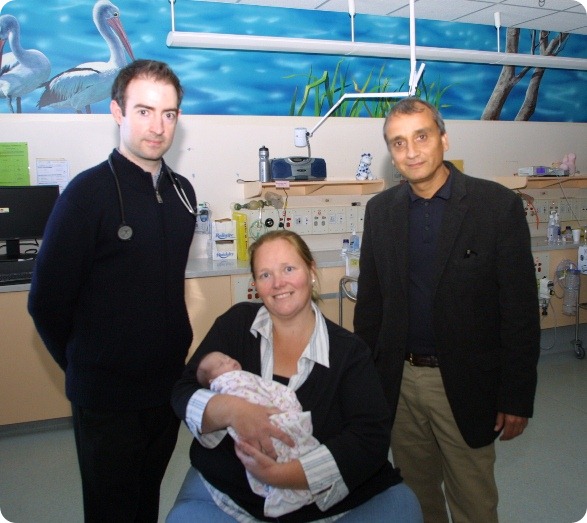An indication of whether a mother will develop pre-eclampsia, the most common and severe pregnancy-related disease, has been identified by a University of Sydney study.
The findings, published in the latest edition of the Journal of Reproductive Immunology could allow the early detection of pre-eclampsia, is currently unable to be diagnosed by symptoms before the disease occurs.
The research also suggests the womb may have a lasting impact on a child’s immune system.

(Left to right) – (Lead author) Dr David Eviston Sydney Medical School, (pre-eclampsia sufferer) Kristy Herd, (baby) Hayley Herd and (Senior Author) Professor Ralph Nanan, Sydney Medical School.
“Pre-eclampsia affects an estimated 5000 to10000 women in Australia every year,” said Professor Ralph Nanan, senior author of the study, from Sydney Medical School Nepean.
“It develops in mothers out of the blue, usually in the last three months of pregnancy, causing high blood pressure, kidney and liver damage and severe blood changes. Delivering the baby as soon as possible is the only way to stop it.”
In pre-eclampsia the mother’s immune system appears to attack the fetus.
“Our study looked at the thymus of the fetus, a structure which sits behind the baby’s breastbone and is known as the ‘cradle’ of an important set of white blood cells called thymus-derived lymphocytes or T cells,” said Professor Nanan.
No previous study has looked at the effect of the disease on the fetal organ systems.
“Surprisingly we found the thymus of babies whose mother developed pre-eclampsia was significantly smaller than in babies of healthy pregnant women.”
What further surprised the researchers was that these changes were obvious in mid-pregnancy, long before the mother developed any signs of pre-eclampsia.
“This is a very interesting finding as the thymus plays a central role in shaping the child’s immune system and protecting it against the development of allergies, autoimmune disease and cancers later in life,” Professor Nanan said. .
The group is now conducting a prospective study with over 1200 pregnant women to confirm the findings with the long-term prospect of developing a test for pre-eclampsia. It is also conducting studies which aim to describe the short and long-term effects that early thymus changes have on the child’s immune system and on the development of immune diseases.
The study was conducted by David Eviston, and Ann Quinton and a team of researchers from Sydney Medical School Nepean.
This was a case-control study with 53 pre-eclamptic and 120 healthy control pregnancies, matched for maternal age, gestational age and smoking. Fetal thymus diameter was measured as the greatest width perpendicular to a line connecting sternum and spine based on ultrasound images taken at 17-21 weeks gestation.